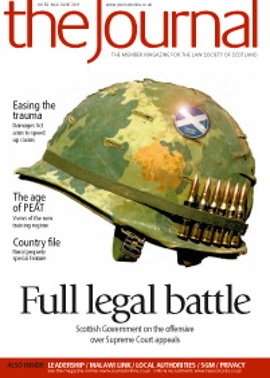Grief revalued
Those who read my article, “The Price of Grief” (Journal, April, 12) will recall that I advised that the question of the appropriate level of s 1(4) loss of society claims was expected to be the subject of judicial consideration in the near future. I expressed the hope that the courts would find a means of bridging the widening gap between jury and judicial awards.
Lord Woolman is the first to address the issue in the case of Bellingham v Todd [2011] CSOH 74. The deceased suffered fatal injuries when his motorcycle collided with the back of the defender’s vehicle, which had braked suddenly and without good reason. The Lord Ordinary found in favour of the pursuer, subject to a significant level of contributory negligence. Unsurprisingly, the Lord Ordinary was asked to have regard to recent jury decisions when considering the appropriate level of loss of society awards.
The judge adopted the accepted criteria used in previous awards, inter alia, Girvan v Inverness Farmers Dairy 1998 SC (HL) 1, 24 and Shaher v British Aerospace Flying College Ltd 2003 SC 540, namely:
- that the assessment of damages is essentially a jury question;
- such awards should reflect the expectations of society;
- the court is therefore encouraged to look for guidance to jury decisions;
- reliance can be placed upon a consistent pattern of jury awards, but caution should be exercised before (i) reliance is placed on only one jury award, or (ii) equiparating awards in respect of different classes of relative.
He made the following awards: to a 37 year old widow for loss of 40 year old husband, £50,000; to a three year old son and seven year old daughter, £25,000 each; to a 25 year old son, £15,000; to an adult brother, £10,000; and to parents, £15,000 each. These awards are broadly in line with previous judicial awards.
In arriving at these awards the Lord Ordinary was not persuaded that the recent series of jury awards constituted a consistent pattern from which the judiciary could derive guidance. He did concede that in the category of loss of a child there was “a possible pattern”. However, even in this category he adopted a cautious approach.
Readers of my recent article will recall that between October 2010 and March 2011 there have been five jury awards to parents in four cases, ranging between £90,000 and £100,000. However, four of the awards were concerned with the three “Nimrod” cases. Lord Woolman took the view that these cases had to be treated with caution as “the jury might be thought to be especially sympathetic to young men who had died in the service of their country”. The fifth decision, Thomson v Dennis Thomson Builders Ltd, 2 February 2011, unreported, is currently under appeal and therefore was not considered.
With regard to the other family members, the Lord Ordinary pointed out that there were still too few jury decisions for the court to accept that a definite pattern had been established.
The lesson to be drawn from the Bellingham decision is clear. If pursuers choose to seek redress from a judge they must continue to expect, if Bellingham is to be followed, an award in line with judicial precedents. Should they choose a jury trial, they can expect a considerably higher award if the recent jury awards are anything to go by. However Bellingham does perhaps point to a solution to the present disparity between judicial and jury awards. Far from rejecting the validity of the recent jury awards, the Lord Ordinary reaffirmed that “Jury awards provide a surer guide to the correct level of damages”. Accordingly, if juries become the default choice in fatal cases, any lingering doubts whether a “consistent pattern” has been established will quickly evaporate.
In this issue
- Breaking new ground
- A&A accounts and abatements
- What price privacy?
- Power struggle
- Rural peace?
- Damages for our times
- Grief revalued
- Up to speed?
- Into Africa
- Expenses review opens with invitation on issues
- Law reform update
- From the Brussels office
- Dundee students join advice network
- The learning curve
- Ask Ash
- Guiding hands
- Marriage made in heaven?
- Email on the spot
- One for the accused to prove
- Going for growth
- A brake on termination?
- The colour yellow
- All change on the croft
- Natural justice in play
- Website review
- Book reviews
- A time of opportunity
- Rural property - Who wants to be a green wellie conveyancer?
- Rural property - Buying and selling: pitfalls and problems
- Rural property - In the taxman's sights
- Rural property - Farm tenancies: more changes imminent
- Now we are 10






